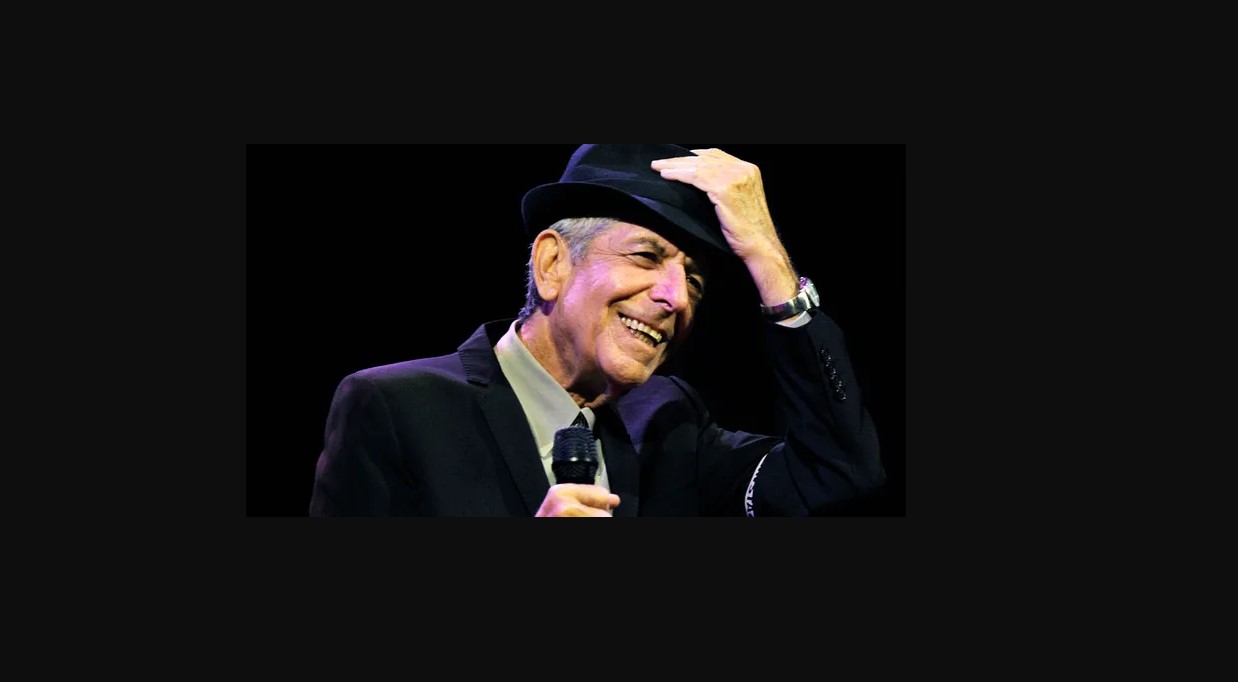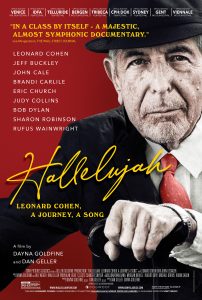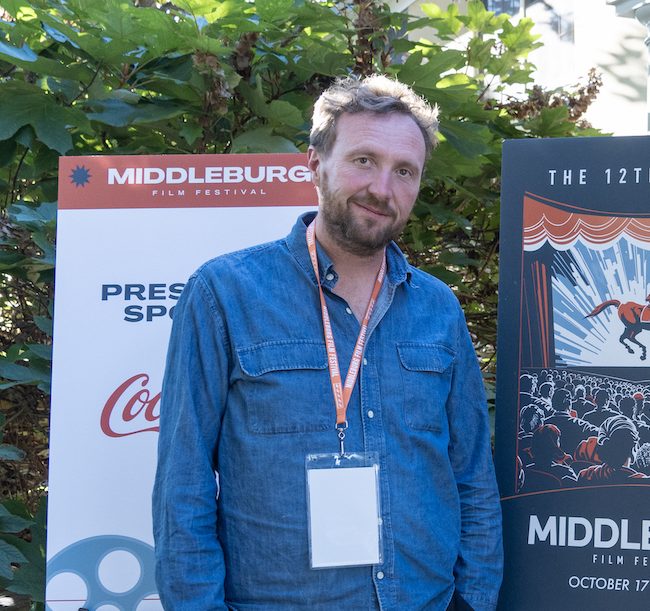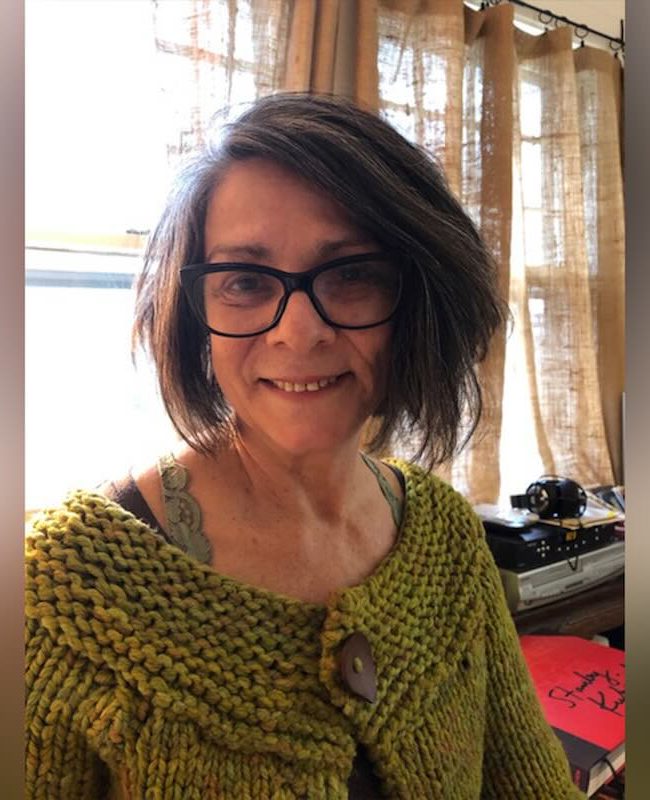A Conversation With Daniel Geller & Dayna Goldfine (HALLELUJAH: LEONARD COHEN, A JOURNEY, A SONG) Part 3

(Jonathan Marlow’s excellent, 3-part interview with Hallelujah: Leonard Cohen, a Journey, a Song filmmakers Daniel Geller and Dayna Goldfine continues. Part one can be found here and part two, here.
Hammer to Nail: What is that thing that motivates people to create?
Geller: Even in The Galapagos Affair—because you’re trying to create a new sense of life and what it should be—how do you generate that and what are the problems and obstacles?
HtN: What, then, is your process when you’re interviewing your subjects? Because you’re generally not—thankfully—part of it.
Goldfine: Thank you for not wanting us to be part of it.
HtN: It is a choice.
Goldfine: You often hear my voice.
HtN: When you talk about the “Greetings from Tim Buckley” performance, for instance, you can hear your voice at the beginning of that question.
Goldfine: Setting it up, yes.
HtN: Here is the proverbial ball. Here I am tossing the ball into the air to allow you to hit it over the proverbial net. Sometimes you need that.
Geller: That happens only when the context of the question isn’t apparent. We never ask people to say it again because that just kills it. Part of what you’re putting out there is—even though we come in very prepared with questions—to let it go if someone is moving in a different direction. Don’t cut them off and say, “Well, I have another question here.” Just pursue that avenue for a while and see what comes up.
Goldfine: But also, whenever possible, we really try to break bread with someone before we interview them. With Ratso, we’d definitely gone out to dinner two or three times before we had that interview. With John Lissauer, we did the same. He lives…
Geller: …in Katonah, Westchester…
Goldfine: …maybe forty-five minutes outside of the city [NYC]. We drove up there and had lunch with him. We were there a couple months before we shot. With Dominique, we first talked to her on the phone.
Geller: It wasn’t always possible [to meet in advance].
Goldfine: With musicians like Eric Church and Brandi [Carlile], we had fifteen minutes with them.
Geller: Or with Glen Hansard. But all three are open‑spirited. When they agreed, they threw themselves into it and they talk very honestly, without hesitation, about very deep things. Maybe that is partly why all three are fantastic singer‑songwriter-performers. They’re a little bit willing to be raw.
Goldfine: With all of the Leonard Cohen direct-connects, in most cases, we had a meal with them or coffee in advance. When we couldn’t—like Adrienne Clarkson in Canada or Dominique in France—we would just do a phone call. We really try to establish a connection ahead of time.
Geller: The recording artists and writers are deeply complex people and they see the song, which is also deeply complex. I think that is why those versions are so good, too. They see it for the depth, the nuance, the contradictions that are in there. Rufus [Wainwright] came to it by accident.
Goldfine: There was a sequence we cut about Rufus’ love‑hate relationship with the song. He’d hated Jeff Buckley because Jeff was his same age and had a better career and was more beautiful. That would be a good DVD extra. I would say that he is maybe the exception in that he came to the song because it was given to him and he was asked to sing it. Then it just stuck to him. Someone like Myles Kennedy, he heard it on Jeff’s album Grace and thought, “What did I hear? That was amazing.” He was also in his twenties. For him, it was the sexual politics at that age. You should look it up on YouTube and just watch him singing it. When he gets to that verse about “all I’ve ever learned from love,” it is so painful. When we were interviewing him, we asked him about the, “I couldn’t feel, so I tried to touch” verse, he said, “At this point in my life, now that I’m in my forties, that is the verse that I would love to explore.” I think a lot depends on where you are in your life.
HtN: In a way, in the unlikely event that we’re all still around in forty years,we could do a coda to the film and ask everyone what they find in the song at that time. It is poetry. If it means one thing to you today, it might mean something else tomorrow.

Geller: We cut a few scenes out of the movie because they just wouldn’t fit. Alan references one in this piece he just wrote that was excerpted in Esquire magazine (since his book is being reissued with a new foreword and afterword). Ultimately, it was the opposite of what Robert Kory had said: Leonard’s work is timeless. I think that the movie is, more or less, also timeless. We’re not trying to be specific about other events. This gets to what you’re saying about how someone’s understanding of the song can shift. We shot a scene with Kate McKinnon and the writers at Saturday Night Live. The week that Leonard died was the same week that Donald Trump was elected. They were trying to figure out what to do with the cold-open to the show. Of course, Kate McKinnon had been playing Hillary Clinton throughout the whole election campaign. They decided to honor Leonard and this political moment. Why not have Kate perform ‘Hallelujah’ as Hillary Clinton? It is really strong. She is a pretty reasonable singer and pianist. She turns to the camera and says, “I’m not giving up and neither should you.” In the interviews that we shot in the SNL writers room, everyone was talking about how the decision was made and which verses to sing. Kate then started describing that she’d always thought the song was about love and relationships and how love is a slog. Then she chokes up and starts crying. She said, “Now I see it’s about democracy and about our hope to make a better world and a better society for ourselves. It’s a hard thing and this is a setback.” It was a beautiful evocation of how the song flipped for her all of the sudden. It is all the more amazing that she was able to sing it without breaking down. Live from New York. It’s a beautiful moment.
Goldfine: That was in there until not long before we went to Telluride and Venice. Basically, we just gave Alan all of our transcripts. He was able to take much more of the actual conversations amongst those writers and Kate and explain how they came to that moment. It was a hard one to give up because it was such a coup to have gone into the writers room and get all of that.
HtN: Another extra, perhaps.
Goldfine: You know the adage about babies? It was definitely the worst baby I had to get rid of [with the bathwater].
Geller: The whole notion of the brokenness of the world is maintained throughout the whole song—and the whole movie—and about Leonard’s grappling with, “How can there be a God if there is such horror? But how can we not hope for something better for ourselves?” The whole movie addresses it, in a way. We didn’t need that [scene].
HtN: In your mention of timelessness, there is something that occurred to me in relation to McCabe & Mrs. Miller. The notion of taking a period film but putting contemporary music in it that would seem incongruous because these songs are clearly from another time. However, it is difficult to imagine the film without it. It is essential to the texture of it. It was unusual then but rather common now. Clearly, the first three or four Cohen albums are of a similar grain. They speak to something that is unified from his late-1960s to mid-1970s records which he breaks from thereafter (for better and, in the case of Death of a Ladies’ Man, for worse).
Geller: You’re mentioning something interesting because we’ve been watching Peaky Blindersand also Gentleman Jack. Both have ahistorical music in them.
HtN: Which is a thing these days.
Geller: It is completely out of step with the sonic composition style of what you would have heard then. McCabe and Mrs. Miller is interesting because those songs are in the folk vein. Right? It could be the early-1900s [when the story of McCabe… is set]. It is situated along with those lyrics although, of course. It situates itself a little differently in there.
HtN: The versatility is unusual. His music can fit in all of these different places and be open to all of these different interpretations.
Geller: I look at liturgy that way. With liturgical song, they were composed hundreds of years ago and yet they still work. They still feel right.
HtN: There is something in his writing, something that is operating on another level that isn’t speaking of a specific time. Clearly, there is a great deal of music that has been written in the last several decades that are such a product of the particular moment when they were written that they don’t transcend the time in which they were released.
Geller: Technologically of a moment as well which is why, when Lissauer talks about the Casio, he says, “I thought he was putting me on.” He didn’t stick with the Casio for very long, did he?
HtN: Just enough to leave something…
Goldfine: That whole album he did with Sharon was all electronic.
Geller: By then it was an electronic keyboard which has a very different sound.
Goldfine: Still, it was very synthetic. Sharon kept saying, “Are we going to go and re-record this?” With the 10 New Songs album, Leonard said, “No. I like exactly what you’ve got here. This is perfect.” [laughs] On Various Positions, they were using that super expensive, fancy, giant clavalier or something like that…
HtN: The Synclavier?
Goldfine: Synclavier, yes. John said, “If you’re insisting on using that kind of synthetic sound then let’s go for the Synclavier.”
HtN: Makes a significant difference [compared to an inexpensive knockoff].
Geller: One of the things that stays so deeply with me from The Summer of Soul is watching Stevie Wonder play that Synclavier on stage. It was really some of the most extraordinary concert footage I’ve seen.
HtN: If you’re exceptionally talented, you can evoke sounds out of nearly any instrument and make something that, in other hands, might sound dreadful. You could just make that thing come to life.
Geller: If you were to put a Stradivarius in my hand, you would hear awful, horrible, ridiculous noises.
HtN: Granted, if someone else had made this film, it might’ve also been terrible.
Goldfine: I don’t know if it would be terrible. This film started out with a whole other strand that we were really going to pursue. We thought that we were going to find one or two or maybe even three artists who had never covered the song and film them in the process of deciding how to cover it. That was one of the main reasons that Hal [Willner] came on. He was going to help us find those people and…
Geller: …produce the recordings.
Goldfine: Hal was thinking, “You’ve got to do one that is a joke. Let’s see if we can get the guys from…”
Geller: A Mighty Wind.
Goldfine: “…back together.” They can say that they actually wrote it. It was going to be this whole hilariously silly thing. Then, when he saw the first cut of the first act, Hal turned to us in his studio in New York and said, “You don’t need those musicians, do you? I can see that it is going to be different from what you’d thought.”
Geller: The movie was demanding to be about Leonard. That is what, as Nick Dorsky says, “The movie will declare itself. You have to listen to it.”
HtN: If you’re open to it. I think your instincts are correct. I am reluctant to say this out loud but the thing with almost every other film about Leonard Cohen is that it isn’t equal to him. This is one of the only films about his work that is up to the necessary level. It has the variety of his personality in it. The film allows for all of those elements to be present.

Geller: We chose not to make it an exhaustive biography. Every piece of Leonard’s life that is in there are incuded because they just give you the framing for where he was as a creator and a spiritual seeker. We just hopscotch all over the place. There is a continuity to it, though. Obviously, you don’t feel like you’ve suddenly lost thirty years and what the hell happened? Which I’ve seen other films (not about Leonard) where I go, “What the heck? What happened in those [missing] twenty years?” The biography was always through the lens of the song—and what he was driving at with that song—and that gave us some freedom to say, “We don’t have to talk about this and we don’t have to talk about that. We can just move ahead.”
HtN: How long was the initial edit?
Goldfine: It wasn’t that much longer.
Geller: Two hours and twenty minutes, maybe.
Goldfine: Each of the sections was a little long. The main reason I was really terrified was that I was intimidated by Leonard. “Am I able to do him justice?” I’ll never pretend to be as wise and articulate as Leonard Cohen but can I somehow channel him enough to do him justice? It was a really scary task.
HtN: There is a whole era of immensely creative National Film Board of Canada and Canadian Broadcasting Corporation work. It speaks to the benefits of an artistic funding mechanism to allow for work to be made that doesn’t have to aspire to be commercial. There was Glenn Gould’s Idea of the North, for instance, with a film version [directed by Judith Pearlman] of his radio-essay. The film, like the aforementioned Ladies and Gentlemen… Mr. Leonard Cohen, explores avenues that no one would likely tackle today. Can you imagine someone today saying, “I’m going to make a forty-minute documentary about a poet that no one outside of our neighbourhood has ever heard of?”
Geller: There were a few years in the early ‘net—just a few years—where some of that was happening but not with the same artistic intensity that something like Ladies and Gentlemen…One of the preeminent sound recorders and sound mixers in Canada, Ron Alexander, was my film school professor, along with Chris Samuelson during graduate school at Stanford. He was part of all of those early National Film Board documentaries and they’re beautifully constructed. There is so much thoughtfulness in craft.
Goldfine: The other film I really love—it was really hard to find—was also done by a Canadian and we used pieces of it. It was Leonard’s tour with Sharon in the late 1970s and it is really beautiful. [The Song of Leonard Cohen (1980) dir. Harry Rasky]
HtN: I remember seeing clips from that.
Goldfine: Our consulting producer found a version of it with French subtitles [and it can be found online in this form without too much searching] and then, at the very end, Robert found us a version without the subtitles. You get a sense of Leonard at that one period of life. The real Leonard.
HtN: With the whole world ahead of him.
— Jonathan Marlow [@aliasMarlow]











